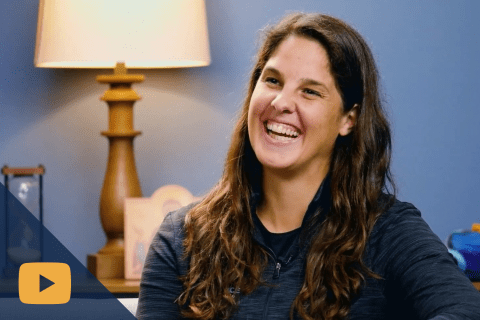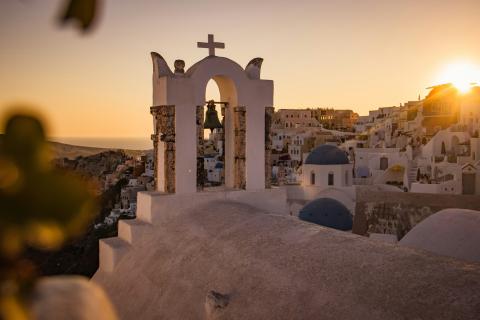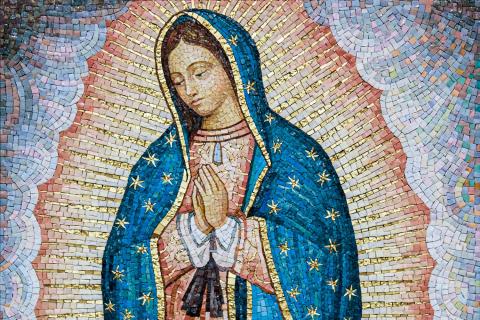
The following talk was delivered by Archbishop Charles J. Chaput on March 20, 2019, upon his reception of the University of Mary's Lumen Vitae Medal, which is given to "those who are champions of Catholic education and who bring others closer to Christ and his Church."
I want to talk about vocations today, especially to the young people in the audience, but I want to do it in a roundabout way. So I hope you’ll bear with me. I also need to express my gratitude for this award. I don’t deserve it, but I’m happy to have it for two reasons. First, because it comes from a university whose courage and fidelity I greatly admire, and second, because it gives me a reason to spend time with you.
Time is precious. Time matters. It matters because we really have so little of it in any life, and if we misuse it, we never get it back. I’ll be 75 this year, so I’m old. Many of you here tonight are young. In a sense, I’m already the past. You’re the present. Time and experience separate us, but when we listen to and learn from each other, we make a future for the Gospel by using our time well together in the world.
Part of using our time well is seeking to understand the time and the lives that came before us. History is simply a record of time past. I love history. Every Catholic should love history because the Church has shaped so much of it. History matters because it grounds us. It gives us a firm place to stand and make sense of the world. History is to peoples and communities as memory is to each of us as persons. Without memory we have no identity, no past, and no direction for the future, which means that others will tell us our history, and who we are, and what our future should be. Some of those “others” unfortunately see the Gospel and the Church and those of us who are believers as enemies.
So I want to start with a story from history that might be helpful to our purpose today.
There was a man named Parmenion. He was a friend and general of Alexander the Great. On a morning in 331 BC, he and 40,000 other Greeks found themselves on a plain in Asia called Arbela. If you were Parmenion, as you formed up for battle, here’s what you noticed. You were hundreds of miles from home and any help. Your enemy, the Persian King, was fighting on his home ground. The Persians had chosen and prepared the battlefield in advance to give themselves maximum advantage. The enemy outnumbered you 2-to-1 in infantry and 5-to-1 in cavalry. They had war elephants and chariots. You had none. The enemy battle line stretched more than a mile past your own, which almost guaranteed your envelopment and destruction.
On your side, you had your skills and courage, and of course, Alexander.
The Greek battle plan was simple: Parmenion was told to hold the left side of the Greek line while Alexander and his horsemen rode far to the right. Alexander would try to spot any weakness in the Persian line, drive straight through it, rout the Persian king, and then return to relieve Parmenion. In other words, Parmenion’s job was simply to stand his ground. With that, Alexander rode off, and the battle was joined.
For the next hour, and then another, and another, and another, and another, Parmenion took the full weight of the Persian attack – all of it without any word from Alexander, who might have been killed or captured, or wounded, or forgotten about him, or simply fled. But Parmenion kept fighting: that’s the task he was given. By mid-afternoon, the Persians had broken through on both sides of his men, and it was only then, when Parmenion was completely surrounded, that Alexander finally returned, routed the Persians, and won the day.
That’s a true story. The Battle of Arbela is one of the great turning points in history. Arbela ensured the destruction of the Persian Empire and the spread of Greek thought and culture throughout the ancient world, a fact that still shapes our lives today. And it’s not too much of stretch to say that one man – Parmenion – was the hinge on which history turned, just by trusting his leader and standing fast when that seemed hopeless and impossible.
Defending our beliefs is an important skill in the moral life, but all of us want more than that, and discipleship is about advancing the Gospel, not merely sustaining or protecting it.
Now there’s a lesson and a caution in the story I just told. C.S. Lewis once described Christianity as a “fighting religion,” and it is. Our weapons are very different from the hatred and violence of a battlefield, but the combat is just as real. Spiritual warfare has a long and biblically rooted tradition in Christian life because Satan is real, evil is real, and there’s no neutral ground in the struggle for the soul of the world. In the end, we’re either with God and for God, or we’re against him. We need to choose.
The lesson in the Parmenion story is this: a lot of Christian life, in difficult times like our own, involves just holding firm to the Gospel and the Church and the basics of what we know as Catholics to be true, especially when those things are inconvenient, or when they seem pointless, or when they begin to cost us friends and social approval and opportunities. St. Augustine, who was no stranger to sin or dark times, said that being faithful in little things is a big thing. Today is no different. A large part of sainthood is the choice, again and again, to be faithful when it seems much more advantageous not to be faithful.
The caution in the Parmenion story is this: sometimes holding fast is all we can do, or the best we can do, but in the long run, that’s never enough. God created us for much greater things. Faith is not a fortress or a hiding place. It’s meant to be shared. Experience teaches that the more we consciously seek to love the persons around us, and the more we discipline our hearts to pursue that goal, then the more our capacity for love grows. In like manner, the more we feed our faith by acting on it, the deeper our faith becomes. And when our faith becomes strong, so do our reasons for hope, no matter what kind of challenges we face.
Defending our beliefs is an important skill in the moral life, but all of us want more than that, and discipleship is about advancing the Gospel, not merely sustaining or protecting it. No matter where or when or under what conditions we live, we have a mandate from Jesus Christ to preach the Gospel to all nations. That’s a duty for all of us – there are no exceptions. But much more importantly, it’s a joy and a privilege. And so, like our Greek friend from history, we might want to take a prudent look at the terrain we face in pursuing that mission.
American life today is troubled by three great questions: What is love? What is truth? Who is Jesus Christ? The secular world has answers to each of those great questions, and they’re false.
Today, for secular culture, love boils down to emotional and sexual compatibility, a special kind of friendship between two sovereign and equal partners. It can be very beautiful. But in the end, so the argument goes, it’s the result of our genetic programming. We fall in love because our biochemistries blend well. We care for our children because our instincts tell us to.
In like manner, our secular culture views truth as a matter of individual experience and preference, differing from individual to individual, and grounded in the self – not some overarching reality. What really matter are facts, the kind of hard, measurable data we can see and taste. The only real “truths” we can know about life – again, so the argument goes – are things that material facts tell us. Colors like blue and red don’t really exist, for example: they’re simply our perception of certain variations in the material refraction of light. The “meaning” of events is not inherent in the events themselves or grounded in some higher order, but rather are imagined and imposed by us.
And as for Jesus Christ, well, Jesus was a good and holy man, one in a long line of great ethical teachers, and he’s important in the sense that most Americans still describe themselves as in some way “Christian.”But the “Son of God” and “Savior of the World” – that kind of supernaturalist thinking about a first-century minor Jewish prophet is pre-scientific and amounts to superstition.
The world we now share – the one young people will inherit – is a supermarket of ironies.
The key thing about all these secular answers is this: they’re not only false, but dangerous. They reduce our human spirit to our appetites. They lower the human imagination and the search for meaning to what we can consume. And because the human heart hungers for a meaning that secular culture can’t provide, we anesthetize that hunger with noise and drugs and sex and distractions. But the hunger always comes back. The most deeply human questions we can ask – and many of you are asking them right now – are things like, "why am I here?," "what does my life mean?," "why do the people I love grow old and die?," and "will I ever see them again?" The secular world has no satisfying answer to any of these questions, nor does it even want us to ask such questions because of its self-imposed blindness. It cannot tolerate a higher order than itself – to do so would obligate it to behave in ways it does not want to behave. And so it hates, as Cain did, those who seek to live otherwise.
The Word of God tells us several key things. First, love is more than a feeling or an instinct. It’s an act of the will, and it always has a cost in some form of suffering for the sake of others. It involves the free gift of ourselves to another person even at the risk of being hurt. This is why marriage is a covenant and not simply a contract. Contracts always have an escape clause. Love freely refuses an escape clause. Marriage is not a negotiated settlement between two sovereign parties, but two persons irreversibly submitting themselves to each other and becoming one flesh. And what results? New life in children. But in fact, all love, married or celibate, results in new life in one form or another. Just as Christ’s death on the cross watered the earth with his blood to redeem and renew the world, so every act of selfless love bears fruit in new life.
Second, love is more than words and good intentions. Real love is always expressed in action – service to the poor, defense of the unborn child, feeding the hungry, visiting the sick and imprisoned, helping the elderly.
Third, love is always ordered to truth, and truth is bigger than facts or data. Truth is the blueprint that gives facts and data their meaning. There can be no real love without truth because love seeks to lead the beloved to what’s best for him or her. “What’s best” for a person is tied intimately to truth, to the true meaning of our lives. But because God himself is love, there can also be no truth without love. Justice, sound teaching, and orthodox faith are vital to a good Christian life – but they can also become weapons to punish others when they’re not informed by prudence, charity, and mercy.
Scripture also tells us what truth is: it’s more than equations, more than material evidence, but also more than right doctrine and moral behavior, as essential as those things are. The truth about the world and our lives in it is a person: the person of Jesus Christ. He’s the only reliable guide for our journey through the world. Christians follow him as the Apostles did because in him and in his example, God speaks directly to us and leads us on the way home to his kingdom. To put it another way, Jesus is not only the embodiment of God, but also the embodiment of who we are meant to be.
The world we now share – the one young people will inherit – is a supermarket of ironies.
We live in a culture that talks piously about the importance of intimacy and privacy, and then invades both without mercy. The United States is a country with 40 million video surveillance cameras – that’s one security camera for every eight of you and me. Of the five cities globally with the largest video surveillance networks, three of them are right here at home: Chicago, Houston, and New York. The only cities with larger networks are Beijing and London. This doesn’t include tech companies like Facebook, Google, and many others that collect and monetize massive amounts of our personal data every time we use the internet or a cell phone.
This is why marriage is a covenant and not simply a contract. Contracts always have an escape clause. Love freely refuses an escape clause.
We live in a culture that talks about the need for harmony but promotes identity politics and all of the division and hatred that result from it. We live in a culture that celebrates the word 'freedom' but offers us license instead: freedom from anything that suggests some higher purpose to our lives and the obligations that might come with it, rather than freedom for the good, the beautiful, the enduring, and the true.
We live in a culture that agonizes over endangered birds and fish but treats the killing of an unborn child as a kind of personal sacrament. We live, finally, in a culture that talks endlessly about human rights and dignity, but can’t really describe who and what a human being is, whether we have anything called a human “nature,” and why we’re special – much less sacred – animals at all, beyond the fact that most of us are smarter than most other primates.
So yes, the world is a sobering field of engagement. It’s easy to be afraid, and it’s reasonable to ask whether believers, and especially young adult believers, have any grounds for hope at all. I’ll answer that, and turn finally to the matter of vocations, by going back to where we began: history.
I said a moment ago that we live in a difficult time, and it’s obviously true.The challenges we face today come not just from outside the Church, but they come from within her as well. A lot of very good people are angry with their leaders in the Church over the abuse scandal, and justly so. I don’t want to diminish that anger because we need it – it has healthy and righteous roots. But what we do with our anger determines its effect – either as a medicine or a poison. The Church has seen corruption, incompetence, and cowardice in her leaders, including her popes, many times in the past; many more times than most Catholics realize.
And yet here we are. Twenty centuries after the resurrection of Jesus, the Church continues her mission. She survives and continues through the grace of God, but that grace works through people like you and me. All of the great Catholic reformers in history had three essential qualities: personal humility; a passion for purifying the Church starting with themselves, and a fidelity to her teaching, all motivated by unselfish, self-sacrificing love. A good example for us is St. Catherine of Siena. We remember her as a great Doctor of the Church, but she was also a great hound and harasser of the Avignon papacy until it finally gave in to her and moved back to Rome. God calls all of us not just to renew the face of the earth with his Spirit, but to renew the heart of the Church with our lives, to make her young and beautiful again and again, so that she shines with his love for the world. That’s our task. That’s our calling. That’s what a vocation is – a calling from God with our name on it.
I’ve been a priest for nearly 50 years; a bishop for more than 30. Like every other path in life, there have been moments of challenge and failure, fatigue and disappointment. But these are nothing compared to the joy I’ve had – and have – because I know that this is why God created me, to do this work. My life has a purpose. And my purpose today is to be here with you now, and to tell you that your own lives are unrepeatable and precious, that they have a meaning and a purpose that God intends only for you. Only for you.
I’ve served as bishop in three different dioceses, and each has been a great blessing of friends and experiences. I’ve loved them all. But my first love is the Diocese of Rapid City, South Dakota. There’s a beauty and sanity to the Dakotas that you can’t find anywhere else. I also think the devil tends to focus on places like New York and Washington and to see places like Bismarck as less important – which is his mistake. It means a lot of very good things can get done here, right under his nose.
One of my favorite pieces of “stealth” Catholic literature is J.R.R. Tolkien’s great Lord of the Rings trilogy. For anyone who doesn’t know the story, it’s the saga of little creatures called hobbits who live in a beautiful place called the Shire. The day comes when they’re called out of their homes and into a great war between good and evil for the soul of the wider world – a war in which they play the decisive role, precisely because they’re small and so seemingly unimportant.
This room tonight is the Shire. This university is the Shire. It’s also not too very far from the source of the Missouri River, which is a lesson in itself – a river that begins as a trickle and ends as a flood. So too with the lives and the futures formed here in gatherings like this one today. Lives that are well-formed and well-lived shape dozens of other lives and begin the remaking of the world.
And my purpose today is to be here with you now, and to tell you that your own lives are unrepeatable and precious, that they have a meaning and a purpose that God intends only for you. Only for you.
Most of you young adults in the audience tonight, like young people everywhere, will marry and have children – by the way, please have lots of them, because we need more good Catholics – and you’ll make your mark on the world with an everyday witness of Christian life, through work and family and friends.
Marriage and family are profoundly good things. One of the great achievements of the Second Vatican Council was the recovery of the dignity and importance of the lay vocation. The Church has no second-class citizens. St. John Paul II actively sought out lay advisers, apostolic leaders, and friends. Pope Benedict XVI stressed that laypeople are not just “helpers” of the clergy but full and equal coworkers, co-responsible for the mission of the Church, with their own vital path to holiness. Remember that as you consider your future.
But I also need to tell you – and listen carefully, because I guarantee this – that God is whispering to dozens of the men and women here today, right now, about a priestly or religious vocation. Pay attention to the stirrings of your heart. We need more priests. We need more religious. Religious are a living witness to radical conversion and radical love, a constant proof that the Beatitudes are more than just beautiful ideals, but rather the path to a new and better kind of life. Priests have the privilege of holding the God of creation in their hands. Without priests, there is no Eucharist; without the Eucharist, there is no Church; without the Church as a living and organized community, there is no presence of Jesus Christ in the world. God hasn’t stopped inviting people to the priesthood and religious life – people have stopped listening for him because they can’t hear God’s voice over the noise and distractions that our world is an expert in manufacturing.
All of us need some time in a day, every day, for silence so we can actually listen for God’s voice. Silence is to the soul as water is to the desert. Without it, our interior life turns to stone. Making time for silence and prayer should be the main Lenten practice for all of us – but especially for anyone seeking God’s will for his or her own life.
I’ll end with just two final thoughts. The first is this. As a bishop, St. Augustine lived at a time when the whole world seemed to be falling apart, and the Church herself was struggling with bitter theological divisions. But whenever his people would complain about the darkness of the times, he’d remind them that the times are made by the choices and actions of the people who inhabit them. In other words, we make the times. We’re the subjects of history, not merely its objects. Unless we consciously work to make the times better with the light of Jesus Christ, then the times will make us worse with their darkness.
That leads to my second thought, which might make a useful motto for this little corner of the Shire. There’s a moment in Tolkien’s novel The Two Towers when the Ring quest seems hopeless and the enemy seems far too strong, and the hero of the story – a hobbit named Frodo – asks his friend Samwise whether it’s worth going on. The answer he gets is "yes": “Because there’s some good in the world, Mr. Frodo, and it’s worth fighting for.”
There’s some good in the world, and it’s worth fighting for. That’s a pretty good description of the vocation God asks from each of us. If Parmenion could trust Alexander, I think we can really and truly trust the God who made us. So let’s pray for each other as friends across the years – friends of each of other, and friends of God – because God listens, and it’s in his friendship, the friendship we all share, that we have the first taste of heaven.


